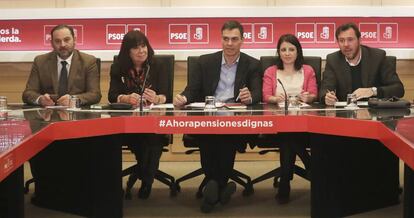Why Spain’s political left is in decline
Around 1.7 million left-wing voters say they would consider voting for a different party or abstaining

Spain’s two main leftist parties, the Spanish Socialist Party (PSOE) and the far-left Podemos party, are struggling to maintain their voter base.
Support for Podemos has dropped significantly since it swept into politics four years ago with a popular anti-austerity message. But the PSOE has been unable to win over disenchanted Podemos voters. According to a Metroscopia voter intention poll commissioned by EL PAÍS, as of June PSOE has recovered 13% of its voter base back from Podemos but around 21% of Podemos voters – almost 1 million people – are not persuaded by either party’s platform. Another 14% of PSOE supporters are in the same position.
Only 31% of Podemos voters approve of Pedro Sánchez José Pablo Ferrándiz
The figures point to a declining left sector, made up of some 1.7 million people, who could be swayed to vote for other parties or opt to abstain.
“I call upon you to mobilize. The parents and children of the working class cannot let them dismantle our legacy: the welfare state,” said PSOE leader Pedro Sánchez at a meeting last Saturday in Madrid on pensions.
Sánchez has begun the year trying to rally disenchanted progressive voters, aware that the sector is in decline.
In the case of Podemos, the Metroscopia poll shows that only 54% of its voters are committed to voting again for the same party – some 2.7 million people. But where are the rest of the five million people who voted for Podemos in the 2016 general elections? According to the poll, 21% (nearly one million) are demobilized and 25% (1.4 million) say they are willing to vote for another party.
Around 1.7 million people could be swayed to vote for other parties or opt to abstain
PSOE meanwhile has 66% voter loyalty. This means that the party would only retain 3.5 million voters of the 5.4 million who voted for PSOE in 2016 if elections were held today. Of its supporters, 14% (700,000) say they are undecided or would abstain and 20% – around one million voters – say they would consider voting for another party.
While the next general elections are not set to take place until 2019, PSOE leader Sánchez is already calling on Spaniards to vote strategically.
“We have to unite the leftist vote towards the only force that is able to win against the double-headed right [in reference to the incumbent Popular Party and Ciudadanos], PSOE,” said Sánchez on Monday.
Sánchez is hoping to reinvigorate leftist voters with a series of proposals including a tax on banks to fund state pensions, community assemblies and bringing back the rhetoric against “political and media elites.” But there is doubt over whether he can win over Podemos supporters.
“It’s more likely that they will stay at home or vote again for Podemos,” says José Pablo Ferrándiz, chief researcher at Metroscopia. “Only 31% of Podemos voters approve of Pedro Sánchez and only 20% of Podemos approves of PSOE’s performance in Congress,” he explains.
The parents and children of the working class cannot let them dismantle our patrimony: the welfare state Pablo Sánchez
Podemos, however, is optimistic it can recapture disappointed supporters despite the dwindling approval ratings of its leader Pablo Iglesias.
This challenging moment for the left comes as relations between Iglesias and Sánchez have hit their lowest point. After PSOE declared Podemos was not its preferred partner, the leaders of the two parties have been embroiled in a public tit-for-tat. Iglesias claimed that “the word that rhymes with PSOE is disappointment,” while Sánchez demanded Podemos’ “past errors” not be forgotten – in reference to Podemos’ refusal to support a PSOE government in the 2016 elections, which led to a repeat election that landed Prime Minister Mariano Rajoy in power.
“The electorate is demobilized because PSEO and Podemos don’t understand one another and have not put forward a project that could be seen as an alternative,” says electoral analyst Jaime Miquel.
The next general elections in Spain are not scheduled until 2019.
English version by Melissa Kitson.
Tu suscripción se está usando en otro dispositivo
¿Quieres añadir otro usuario a tu suscripción?
Si continúas leyendo en este dispositivo, no se podrá leer en el otro.
FlechaTu suscripción se está usando en otro dispositivo y solo puedes acceder a EL PAÍS desde un dispositivo a la vez.
Si quieres compartir tu cuenta, cambia tu suscripción a la modalidad Premium, así podrás añadir otro usuario. Cada uno accederá con su propia cuenta de email, lo que os permitirá personalizar vuestra experiencia en EL PAÍS.
¿Tienes una suscripción de empresa? Accede aquí para contratar más cuentas.
En el caso de no saber quién está usando tu cuenta, te recomendamos cambiar tu contraseña aquí.
Si decides continuar compartiendo tu cuenta, este mensaje se mostrará en tu dispositivo y en el de la otra persona que está usando tu cuenta de forma indefinida, afectando a tu experiencia de lectura. Puedes consultar aquí los términos y condiciones de la suscripción digital.








































